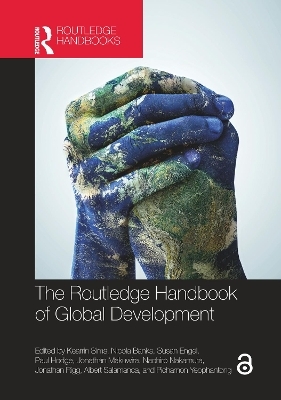
The Routledge Handbook of Global Development
Routledge (Verlag)
978-0-367-86202-2 (ISBN)
This Handbook provides a comprehensive analysis of some of the world’s most pressing global development challenges – including how they may be better understood and addressed through innovative practices and approaches to learning and teaching.
Featuring 61 contributions from leading and emerging academics and practitioners, this multidisciplinary volume is organized into five thematic parts exploring: changes in global development financing, ideologies, norms and partnerships; interrelationships between development, natural environments and inequality; shifts in critical development challenges, and; new possibilities for positive change. Collectively, the handbook demonstrates that global development challenges are becoming increasingly complex and multi-faceted and are to be found in the Global ‘North’ as much as the ‘South’. It draws attention to structural inequality and disadvantage alongside possibilities for positive change.
The Handbook will serve as a valuable resource for students and scholars across multiple disciplines including Development Studies, Anthropology, Geography, Global Studies, Indigenous and Postcolonial Studies, Political Science, and Urban Studies.
The Introduction of this book is freely available as a downloadable Open Access PDF at http://www.taylorfrancis.com under a Creative Commons Attribution-Non Commercial-No Derivatives (CC-BY-NC-ND) 4.0 license.
Kearrin Sims is a lecturer in Development Studies at James Cook University, Australia. Nicola Banks is a senior lecturer in Global Urbanism and Urban Development at the Global Development Institute, University of Manchester. Susan Engel is an associate professor in Politics and International Studies at the University of Wollongong, Australia. Paul Hodge is a senior lecturer in Geography and Environmental Studies at The University of Newcastle, Australia. Jonathan Makuwira is a professor in Development Studies and Deputy Vice Chancellor of Malawi University of Science and Technology. Naohiro Nakamura is a senior lecturer in Geography at the University of the South Pacific, Fiji. Jonathan Rigg is a professor in Geography at the University of Bristol, UK. Albert Salamanca is a senior research fellow at the Stockholm Environment Institute’s Asia Centre, Thailand. Pichamon Yeophantong is a senior lecturer at the University of New South Wales, Canberra.
Introduction, PART 1: Changing development configurations, 1. Introduction: changing development configurations, 2. Deglobalization, 3. Retroliberalism and development, 4. Development in the Global North, 5. Debt, 6. OECD DAC development cooperation, 7. South-South Cooperation, 8. Multilateral development banks: old and new, 9. Northern and Southern non-governmental organizations, 10. Philanthropy, 11. Social enterprise and inclusive economic development, PART 2: Sustainability and the environment, 12. Introduction: sustainability and development, 13. Planetary boundaries, 14. Anthropocene, Capitalocene, and climate change, 15. More-than-human development, 16. Gender, sexuality, and environment, 17. Extractivism, 18. Resource conflict, 19. The extinction crisis, 20. Transnational environmental crime and development, 21. Indigenous rights, new technology and the environment, 22. Sustainable food systems, 23. Renewable energy, 24. Transboundary governance failures and Southeast Asia’s plastic pollution, 25. Sustainable development discourse, PART 3: Inequality and inequitable development, 26. Introduction: inequality and inequitable development, 27. Poverty: no meeting of minds, 28. Global financial systems and tax avoidance, 29. Global extractivism and inequality, 30. Spatial inequality and development, 31. Land grabbing and exclusion, 32. Forced displacement and resettlement, 33. Human mobility and climate change, 34. Educational inequality and development, 35. Gender inequality and development, 36. Gender inequality and development pedagogy, 37. Violent development in Xinjiang Uyghur Autonomous Region, PART 4: Game changers of Global Development?, 38. Introduction: game changers of Global Development?, 39. COVID-19 and global health systems, 40. Health and illness, 41. Disability-inclusive development, 42 Citizenship, rights, and global development, 43. Housing and development, 44. Global value chains and development, 45. International and internal migration, 46 Forced migration and asylum seeking, 47. Development and conflict, 48. Children, youth, and development, 49. Ageing and development, PART 5: Reimagining futures, 50. Introduction: reimagining futures, 51. Finding perspective through our more-than-human kin, 52. Activism and development studies pedagogy, 53. Tensions of decolonizing development pedagogies, 54. Decolonial gender and development, 55. Community based service learning for development, 56. Capacity development and higher education, 57. Adaptive programming, politics and learning in development, 58. Southern research methodologies for development, 59. Community economies, 60. Geonarratives and countermapped storytelling, 61. Poetry as decolonial praxis
| Erscheinungsdatum | 08.03.2022 |
|---|---|
| Reihe/Serie | Routledge International Handbooks |
| Zusatzinfo | 20 Tables, black and white; 13 Line drawings, black and white; 22 Halftones, black and white; 35 Illustrations, black and white |
| Verlagsort | London |
| Sprache | englisch |
| Maße | 174 x 246 mm |
| Gewicht | 1560 g |
| Themenwelt | Naturwissenschaften ► Geowissenschaften ► Geografie / Kartografie |
| Sozialwissenschaften ► Soziologie ► Spezielle Soziologien | |
| ISBN-10 | 0-367-86202-6 / 0367862026 |
| ISBN-13 | 978-0-367-86202-2 / 9780367862022 |
| Zustand | Neuware |
| Informationen gemäß Produktsicherheitsverordnung (GPSR) | |
| Haben Sie eine Frage zum Produkt? |
aus dem Bereich


